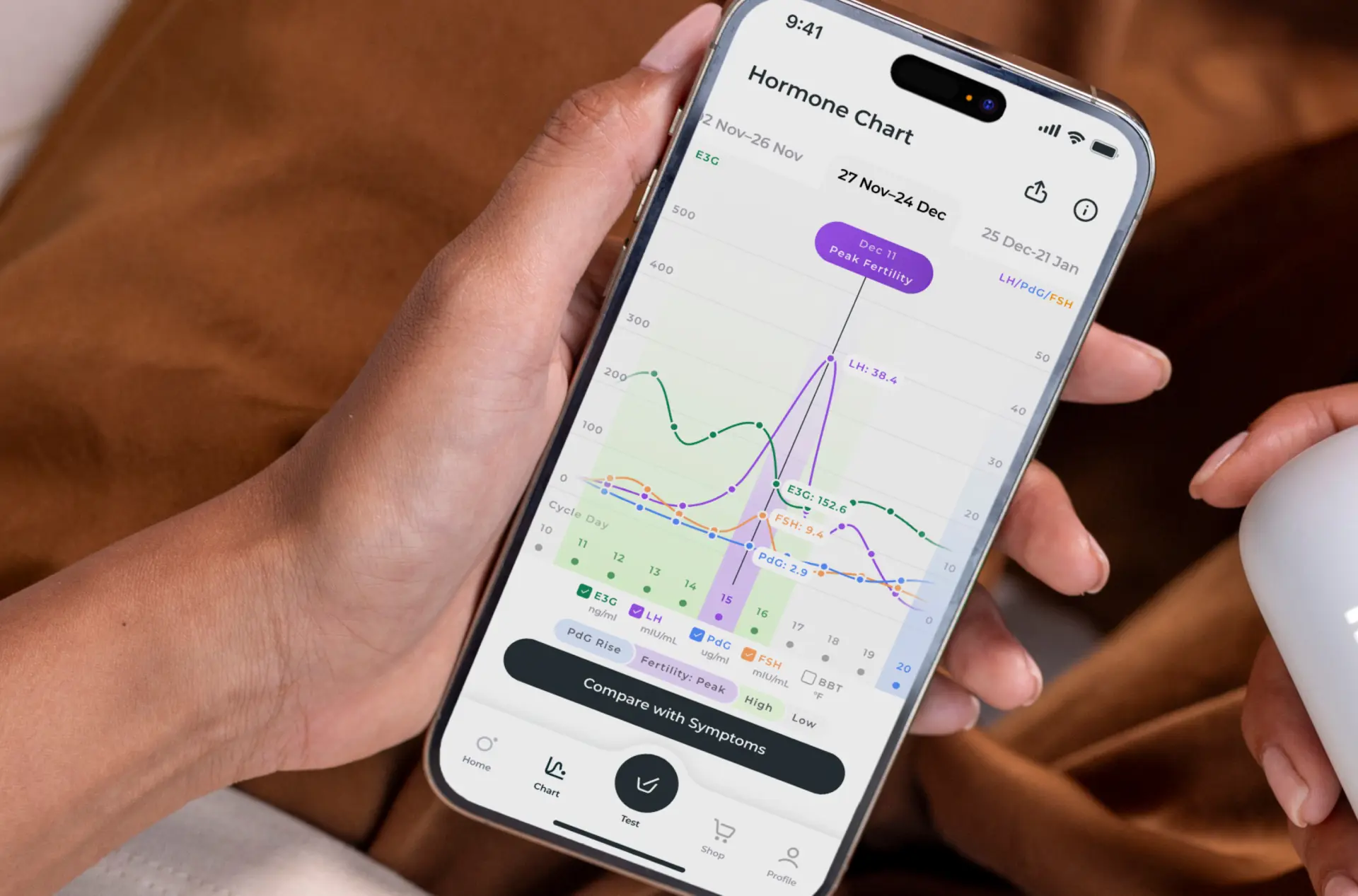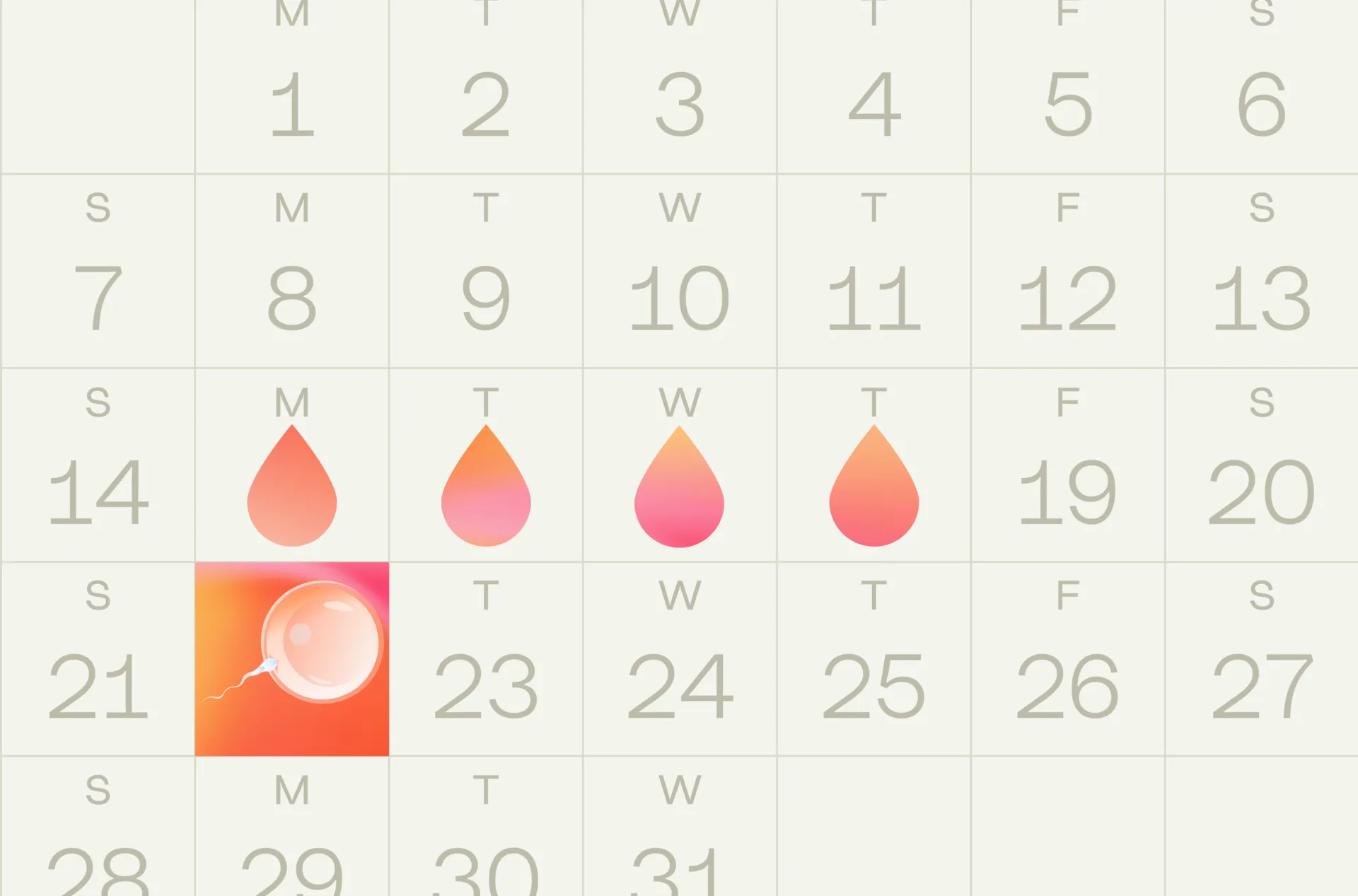Content table
ICYMI, implantation is a key step in pregnancy.
In fact, it’s so key that without implantation, pregnancy can’t happen.
But did you know that the timeline of implantation can affect your odds of pregnancy?
If implantation occurs too early or too late, the body may not be able to provide the embryo with the support it needs to grow into a healthy, happy fetus.
In this article, we’ll be discussing late implantation, the causes and signs of late implantation, when to take a pregnancy test after late implantation, and what you can do to prevent late implantation.
First, let’s take a look at when implantation normally occurs.
TL;DR
- Implantation is when a fertilized egg embeds into the uterine lining.
- The window for implantation is between 6-12 DPO, with the ideal time being between 8-10 DPO.
- Late implantation is when implantation happens after 10 DPO.
- Late implantation increases the risk of early miscarriage.
- The exact cause of late implantation is unknown; it may be due to chromosomal abnormalities and decreased endometrial receptivity.
- Smoking and second-hand smoke are both linked to higher chances of late implantation.
- A longer oocyte waiting time increases the risk of late implantation, so time your sex correctly if you’re looking to get pregnant. Ideally, have sex the day before ovulation.
- Late implantation bleeding can be a sign of late implantation, but it’s not reliable as it only happens in 15-25% of women.
- Though the exact cause of late implantation is not fully understood, you want to reduce your risk of this happening by quitting smoking, timing your sex right, and creating a healthy uterine environment.
When does implantation usually happen?
In an ideal world, implantation happens between 6 DPO – 12 DPO (Days Past Ovulation). Research shows that the most successful pregnancies have implantation that happens between 8-10 DPO.
But those timelines aren’t the case for everyone. Some people find that their fertilized egg takes longer than it should to implant in the uterus, also known as late implantation.
Implantation is considered “late” if it happens at 10 DPO. And this may cause some issues, which we will discuss next.
Is late implantation a bad sign?
Though it’s not always the case, late implantation can affect pregnancy.
Studies show that there is a higher risk of miscarriage if implantation happens beyond 8-10 DPO. For every day after 9 DPO that passes, the chances of miscarriage increase quite substantially.
This information was found by examining late implantation in relation to hCG (human chorionic gonadotropin) levels—the hormone that stimulates the corpus luteum to produce progesterone, helping to maintain a smooth pregnancy in the first trimester.
Here’s what researchers found when looking at late implantation and hCG levels.
(Note that in this study, implantation was measured as happening on the first day that the urinary excretion of hCG was greater than 0.015 ng/mL.)
Day of implantation (DPO) | % of miscarriage |
|---|---|
9 | 13 |
10 | 26 |
11 | 52 |
>11 | 82 |
As you can see, the more delayed the implantation, the higher the percentage of miscarriage.
So, late implantation could be a bad sign.
In this study, women who had a successful pregnancy had an average implantation time of 9.1 DPO. But, those who miscarried before 6 weeks of pregnancy had an average implantation time of 10.5 DPO.
That 1.4 DPO difference may seem small, but clearly, it makes a big difference in the success of a pregnancy.
So, does late implantation directly cause miscarriage? While it’s unlikely that it’s the sole cause, let’s go into a bit more detail about how it can affect your pregnancy.
Less receptive endometrium
A successful pregnancy relies on endometrial receptivity, a.k.a. the process in which your uterine lining preps for the implantation of an embryo.
And your endometrial receptivity depends on estrogen and progesterone to do their jobs.
What is estrogen’s job?
To promote the growth of the inner uterine lining before ovulation.
But, too much of a good thing can sometimes be bad, and that is definitely the case with estrogen. Excess estrogen can lead to issues with your endometrial receptivity.
Plus, the endometrium becomes less receptive as you reach the end of your luteal phase (+10 DPO), and the corpus luteum isn’t as affected by hCG by 11 or 12 DPO.
So, the more DPO you are, the less receptive the endometrium is.
And what’s progesterone’s job?
After ovulation, progesterone regulates estrogen, which is necessary for successful implantation.
Evidence shows that late implantation was linked with lower progesterone levels. This raises red flags because progesterone is essential to thickening the endometrial lining and preventing miscarriages.
So, if late implantation = lower PdG levels, that may mean a higher risk of miscarriage.
Another study had similar findings – that a decreased progesterone/estradiol ratio was seen in late-implanted pregnancies.
Unhealthy zygote
The zygote may not be healthy and have some sort of abnormality, which means it won’t develop as quickly. This can cause implantation to happen later because your body may screen out abnormal embryos.
Another study agrees with these theories about the ways that late implantation can affect pregnancy.
Research also shows that late implantation was associated with a smaller fetus size at 10-14 weeks. Previous studies have found that this smaller fetus size increases the risk of the baby having a low birth weight. This can lead to complications later on in life.
To sum it up, while the latest your endometrium can receive an implant is 12 DPO, 8-10 DPO is ideal. Beyond this, your uterus starts going into a do-not-disturb mode, which can affect your pregnancy and may be associated with a risk of early pregnancy loss.
What causes late implantation?
Now that we’ve given you the 411 on the implications of late implantation in pregnancy, let’s take a look at what may cause implantation to be late in the first place.
Smoking
One study done on women who had late implantation found that those who are smokers are 5 times more likely to experience late implantation than non-smokers. This seems like pretty strong evidence to put down that cigarette.
But in case you need more, the study also found that second-hand smoke can increase the chances of late implantation.
So it’s best to steer completely clear of cigarettes – both firsthand and secondhand.
Longer oocyte waiting time
Another potential cause of late implantation is oocyte waiting time.
Oocyte what?
This refers to the time between when the egg gets released and when it gets fertilized by the sperm – more commonly known as the time between ovulation and fertilization.
A longer oocyte waiting time means you’re getting busy with your partner on the day of ovulation or the day after ovulation.
Once the egg is released, if the sperm isn’t already there, ready and waiting for it, you may experience late implantation.
Why?
If the egg has to wait even just a few hours, it can have a negative effect on embryo development.
Don’t keep the egg waiting; instead, try to get busy in bed the day before ovulation for the highest fertility and the best chances of success with implantation timing.
So, how do you find the right day to have sex? You determine your fertile window.
And what’s the best way to determine your fertile window?
By using the Inito Fertility Monitor. The Inito Fertility Monitor tracks the actual values of your estrogen, LH, FSH, and PdG in your urine to predict when you’re going to ovulate and also confirm ovulation. And it does it all in just one test strip to give you a full picture of your cycle.
What are the signs of late implantation?
There aren’t many things you can look for that may signal late implantation.
But, studies have shown that late implantation bleeding is something to be on the lookout for.
How late can implantation bleeding occur? It can happen after 10 DPO and is close to when you expect your period to happen.
You may be curious how to tell if the bleeding is due to late implantation or your period. Late implantation bleeding is typically short (1-3 days), light, and pink in color, whereas your period usually feels heavier and lasts longer.
With late implantation bleeding comes the dreaded nausea and cramps that you get with your period, too, so get ready for those.
But before you get too worried, implantation bleeding isn’t super common. It only happens in 15-25% of women, so it’s not something you want to rely upon for a sign of late implantation.
Read more: Implantation bleeding Vs Periods | What Does Implantation Bleeding Look Like?
When do you take a pregnancy test after implantation?
Now that we’ve explored late implantation signs, you may be wondering when you should take a pregnancy test after implantation.
It’s essential to take pregnancy tests like you normally would – a.k.a. ideally waiting for the day after your missed period. This gives your hCG levels enough time to rise so that the pregnancy test can pick up on them in your urine.
But the different types of pregnancy tests available differ in their ability to detect small levels of hCG, and some aren’t so great.
So, for the most accurate and reliable read on your hormones and test results, you want to test one to two weeks after your missed period. However, note that some women can get a positive pregnancy test as early as 10-11 DPO.
What is the difference between late implantation and implantation failure?
Late implantation is when implantation happens, but it’s after 10 DPO.
Implantation failure, on the other hand, is when the embryo doesn’t implant in the uterus at all, which results in a negative pregnancy test.
So, how do you know if you’re experiencing implantation failure?
Well, patients who have never shown signs of implantation, such as boosted hCG levels, may be experiencing implantation failure. Also, look out for boosted hCG levels that don’t later show a gestational sac on the ultrasound.
Some of the causes of implantation failure include:
- Uterine abnormalities
- Chromosomal anomalies
- Smoking
- Increased maternal age
- Increased BMI
Implantation failure is more relevant for those undergoing IVF. If you have had three unsuccessful IVF attempts, then you may have recurrent implantation failure or RIF.
How do you prevent late implantation?
Since the exact cause of late implantation isn’t fully understood, you can’t fully prevent it.
But, there is some good news.
As we shared earlier, there are some factors that increase your risk of late implantation, so you can work to eliminate them.
Here’s what you want to do:
Quit smoking
This goes for vaping, too!
Though you may think vaping is less dangerous than cigarettes, when it comes to implantation, you want to stay away from all forms of smoking, including second-hand.
Though there isn’t direct research on how vaping affects implantation, it’s no secret that vaping is bad for your overall health. Plus, when you’re TTC, it’s just not worth the risk.
Reduce oocyte waiting time
How do you close the window between ovulation and fertilization? By having sex in the fertile window, the sperm sits there anxiously awaiting the egg rather than the other way around.
Remember, the egg only lives for up to 24 hours, while the sperm can live up to 5 days!
So you want to have sex before ovulation because your highest chances of conception are 1 day before ovulation. This gets the sperm to where it needs to be, so it’s ready to fertilize the egg when it’s released during ovulation.
Create a healthy environment for the embryo to implant
Do you want to make your uterus a happy and healthy place for the embryo to implant and grow to be a happy and healthy baby?
Here are a few key things to incorporate into your life:
- Healthy diet
- Prenatal vitamins
- Stress reduction
- Adequate sleep
- Monitoring progesterone levels
Read more: How to Make Implantation Successful: What You Need to Know
Was this article helpful?
- Time of Implantation of the Conceptus and Loss of Pregnancy | New England Journal of Medicine
- Pregnancy | FDA
- Endometrial Receptivity | NIH
- Rescue of the Corpus Luteum in Human Pregnancy | Oxford Academic
- Early pregnancy wastage following late implantation of embryos after in-vitro fertilization and embryo transfer | Oxford Academic
- Human Chorionic Gonadotropin | NIH
- Mechanisms of implantation: strategies for successful pregnancy | NIH
- Impact of ovulation and implantation timing on first-trimester crown–rump length and gestational age | Obstetrics & Gynaecology
- The association of maternal factors with delayed implantation and the initial rise of urinary human chorionic gonadotrophin | Oxford Academic
- Post-ovulatory ageing of the human oocyte and embryo failure | NIH
- Bleeding During Pregnancy | ACOG
- Assessment and treatment of repeated implantation failure (RIF) | NIH
- Recurrent Implantation Failure-update overview on etiology, diagnosis, treatment and future directions | BMC












